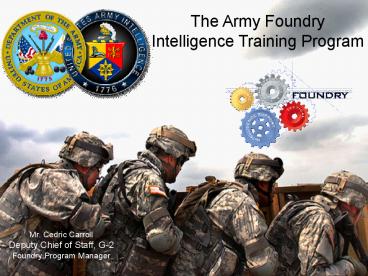The Army Foundry Intelligence Training Program Mr. Cedric - PowerPoint PPT Presentation
1 / 12
Title:
The Army Foundry Intelligence Training Program Mr. Cedric
Description:
The Army Foundry Intelligence Training Program Mr. Cedric Carroll Deputy Chief of Staff, G-2 Foundry Program Manager * Why Foundry? Dynamic Operating Environment and ... – PowerPoint PPT presentation
Number of Views:2969
Avg rating:3.0/5.0
Title: The Army Foundry Intelligence Training Program Mr. Cedric
1
The Army Foundry Intelligence Training Program
Mr. Cedric Carroll Deputy Chief of Staff,
G-2 Foundry Program Manager
2
Why Foundry?
Dynamic Operating Environment and Advance of
Quick Reaction Capabilities Necessitated the Need
to Enhance and Sustain Tactical Force
Intelligence Skills and Provide Regional
Expertise and Technical Training
ACP
- CSA guidance
- Implemented in 2006
- Increase MI technical and operational training
- Increase homestation training
- Reduce TDY
- Maintain contact w/the enemy
- Builds on Institutional Training and Augments
Unit Training - Means to Increase Training of Soldier at Home
Station - Vehicle to Support Readiness Core Enterprise
Maintain Contact with the Enemy GEN Schoomaker
3
What is Foundry?
The Armys Intelligence Training and Readiness
Program for the MI Force
- Provides Focused Advanced Skills Intelligence
Training and Operational Opportunities for
Tactical MI Soldiers - Enhances and Sustains Intelligence Skills and
Capabilities of the Tactical MI Force - Leverages INSCOM and Intelligence Community
intelligence skills for the Tactical MI Force - Facilitates Timely Integration of Relevant TTPs
and Quick Reaction Capabilities Into Training - Enables Commanders to Provide a Trained and
Ready Intelligence Warfighting Function - A Critical Element of INSCOMs Support to
ARFORGEN
4
Bringing Training to the Soldier
Foundry Home Station Training Platforms
Fort Lewis
Fort Drum
NC ARISC
NE ARISC
Draper, UT
Germany
Fort Carson
W ARISC
Fort Riley
Fort Campbell
Fort Irwin
Hawaii
Fort Bragg
SE ARISC
Los Alamitos
Fort Bliss
Fort Stewart/HAAF
Fort Polk
Fort Hood
SW ARISC
INSCOM Detention Training Facility
- 14 AC Foundry Sites
- 12 CONUS (11 Supporting FORSCOM / 1 Supporting
Interrogation Individual and Collective Training - 2 OCONUS (1 Supporting USARPAC / 1 Supporting
USAREUR - 3 ARNG Sites (Transitioning to Foundry)
- 5 USAR ARISC Sites (Transitioning to Foundry)
Legend
Active Component
Reserve
National Guard
5
MI Training Strategy 12 Month Dwell
FC Recommended
Army / Theater Requirements
Home Station
Deployment Experience
CTC (MRE)
Home Station
JI-CTC
RSOI
G2 Cert
CPX
RSOI
RSOI
Foundry Support TRADOC ARCOIC Support Tactical
Over Watch Operational Reach Back
Foundry Support RSOI TPE/QRC
Foundry Support Home Station Training Nodes Live
Environment Training Mobile Training Teams
- Corps Locations Multi-disciplined Platforms
- Major Unit Locations Warm training sites
- CTCs Support Collective Training/TPE
- CONUS and OCONUS, Multi-Compo
6
How Foundry Supports ARFORGEN
Training in an Era of Persistent Conflict
- Personnel 10-13x cadre (4-7x SIGINT, 2x
GEOINT, and 4x HUMINT/CI) with capability to host
other discipline MTT - Training SIGINT, GEOINT, HUMINT, CI, All
Source, BIOMETRICS/DOMEX, MASINT, Dialect
Language (Future Cyber) - Equipment Region Specific Quick Reaction
Capabilities
- Commanders Guidance
- Theater feedback
- Tactics, Techniques
- Procedures
- Center for Army Lessons
- Learned (CALL)
- INSCOM Functional Lead
- Units (704th MI Brigade, 470th MI Brigade,
- 902nd MI Group, 706th MI Group
- US Army Operational Group,
- National Ground Intelligence Center,
- Army GEOINT Battalion)
Assist Unit with IWF Training Strategy
Home Station
Mobile Training Team
Live Environment
Foundry Training Window (Adv Individual Skills
QRC Equipment)
Over Watch Maintain Contact with the Enemy
7
Foundry FY 2010 Recap
8
Foundry FY 2010 Stats
9
Foundry Homestation Training
Total Soldiers Trained to Date 61,519
10
Staying Relevant
- The Foundry Program Synchronization Council
(FPSC) - The Foundry Program Administrator INSCOM
ensures that the training provided to the
Military Intelligence force is properly
resourced, current, relevant, and high in
quality, and incorporates the most modern
equipment and techniques. - The FPSC synchronize the Foundry Program
Platform readiness and training opportunities IOT
ensure the Foundry Program meets implementation
standards and training requirements as prescribed
by the DA G3/5/7, DA G2 and CG, INSCOM. - The FPSC conducts monthly meetings
- The FPSC members are from INSCOM subordinate
commands, MACOMs, and the DA-G2 Foundry Program
Manager
11
The FPSC Objectives
- Receive and evaluate feedback from unit S2 / G2s
and Commanders to assess effectiveness of
training and identify training gaps and
weaknesses. - Assess emerging Foundry training opportunities
for proper validation and relevance. - Review additions / deletions to the Foundry
Training Opportunities Catalog. - Review Foundry Platform build priorities based on
DA G2 and FORSCOM prioritization. - Review Foundry Platform build status to resolve
issues and develop a way ahead. - Determine requirement for the Quarterly Council
of Colonels any relevant information updates and
/ or required decisions.
12
QUESTIONS?































